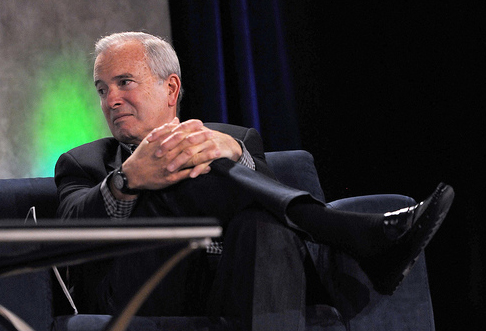Ken Auletta appeared on The Bat Segundo Show #315. Auletta is most recently the author of Googled and writes the “Annals of Communication” column for The New Yorker.
Condition of Mr. Segundo: Wondering if his Chinese food takeout history can be Googled.
Author: Ken Auletta
Subjects Discussed: Clarifying Auletta’s theory of Sergey Brin and Larry Page as “cold engineers,” responding to Nicholson Baker’s review, whether an engineer’s viewpoint is applicable to business, the efficiency of newspapers, Talking Points Memo, journalism that is translatable to the online medium, addressing the Gray Lady’s deficiencies, the McSweeney’s answer to the newspaper, Coach Bill Campbell, Eric Schmidt, Brin and Page’s apparent insensitivity to the book industry, Al Gore’s observations about Google’s eccentricities, the Google Chrome EULA controversy, user trust, the moral dilemma of Google Book Search, whether Google should be recused to some degree because the world has become increasingly privatized, the CIA and outsourcing, whether or not Google Book Search’s threat to an author’s livelihood has been overstated, Google’s obsession with 150, comparisons between Itek and Google, collapsing computers, Auletta’s affinity for control, Eric Schmidt’s views on promotional value, Rupert Murdoch’s recent dealings with Bing, CBS’s early involvement in YouTube, traditional media and online advertising, when Google is efficient, and investigating the semantics of Google’s “Don’t Be Evil” mantra.
EXCERPT FROM SHOW:
 Correspondent: There’s one question that is presented in the book, but never actually quite answered. It’s probably something I just observed. And that is Google’s fixation with the number 150. They have 150 projects. They have cafeterias and conference rooms that are max 150. Did you ever get an answer as to why they were obsessed with this number? Numerologists?
Correspondent: There’s one question that is presented in the book, but never actually quite answered. It’s probably something I just observed. And that is Google’s fixation with the number 150. They have 150 projects. They have cafeterias and conference rooms that are max 150. Did you ever get an answer as to why they were obsessed with this number? Numerologists?
Auletta: (laughs) I don’t think they’re obsessed with the 150 products. In fact, now they’re probably below 150 projects. The 150 — Larry [Page] actually did a search. Larry’s fixated on 150. It’s the size of cafeterias. To have people collaborate and talk to each other and not pull back and engage. And he did a Google search and came up with that answer to confirm his instinct. Now have I done that search to check that he’s right? No, I have not. But he, in his scientific way, came up with that answer. And he goes around the cafeterias. And he’ll say, “This is too big. This is the right size.” You know, each of them have little fetishes that they’re passionate about. And they’re insistent on. And that’s one of Larry Page’s. And who’s to say he’s wrong? They’ve done pretty good.
Correspondent: Let’s go back to the three horses you were talking about earlier. Google is developing anywhere from 150 projects to less, as we’ve just established. Search revenue is starting to dwindle. I’m curious if some of the more recent products — like, for example, Chrome OS, which is an open-source scenario, and Google Wave — these are a little bit different from the norm. Because the learning curve is a little bit more. It’s something that’s more designed for geeks than for regular people. Do you see this as a way of them anticipating that more regular people, more lay people, will become power users? Or are they just essentially carrying on with the same instinct that drove their company in the first place? Which was, “Let’s go ahead and do this and the revenue will come later.”
Auletta: Everything’s a jump all. Everything is “Let’s experiment. Let’s try this.” And that’s part of the genius of Google and the genius of the two founders. Their willingness to try things. To basically ask uncomfortable questions. And the why question: “Why not?” They come into every meeting and they say, Why not? So why not do Chrome? Why not do Wave? Why not have cloud computing? We have this computer capacity? Why don’t we utilize it? And why do people have to spend three hundred some odd dollars for Microsoft packaged software? Why not have it in the cloud which will follow you wherever you go on any device you’re on? So they’re asking those questions and they’re trying those things. And I think it’s much more the latter point. It’s basically: Let’s take some risks. We have the resources to do it. And wouldn’t this really be cool?
Correspondent: Or maybe it’s just a natural expansion. For some reason, reading your book, I was struck very much by the history of Itek in the ’60s. You know, Itek, where they were the people behind Project CORONA. And they just gobbled up companies left and right. Similar to what Microsoft did two, three decades later. But Google is a little bit different in the sense that everything is essentially developed in-house. Does this ensure that they won’t implode like Itek and, to some degree, Microsoft?
Auletta: But Google buys. They bought Android.
Correspondent: Yeah.
Auletta: They didn’t invent that. They bought it and took the guy who invented it. And he’s there running Android for them. Mobile device business. One of the dangers they have — and, for instance, the argument is that they don’t have a social network engine. So they’ve been slower in that area. So you noticed yesterday, what they did, they announced that search would extend to social networks in real time. And it’s a weakness they have. And it’s a weakness that any company, if you rely just internally. It can be a weakness if you just go out and acquire, and outsource everything. They’re trying to do both. Will they succeed? I don’t know. No one knows. The game continues and there’s no end in sight. But at some point, we’ll find out. Other great companies failed and then came back. Apple failed and then came back. So I take a long view of this stuff. They are trying things, but they’re getting large. And as you get large, you start losing creative people.
(Image: JD Lasica)
BSS #315: Ken Auletta (Download MP3)
